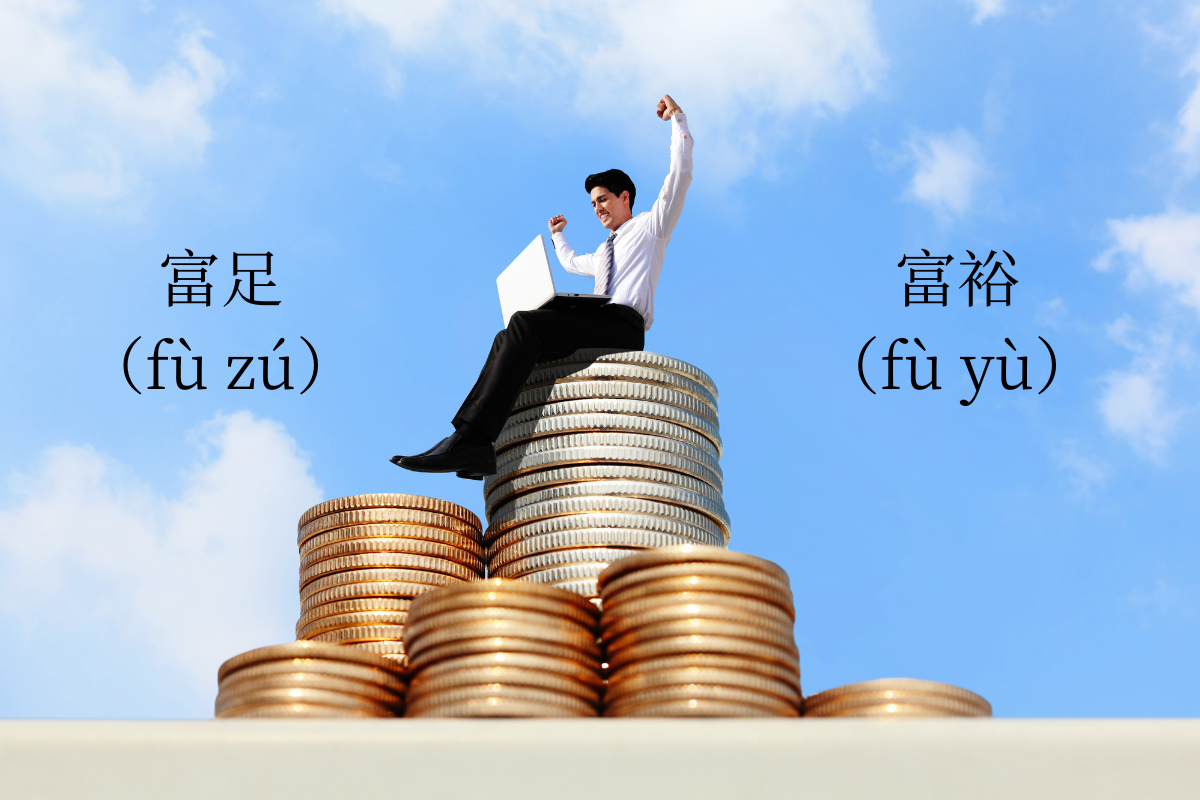HSK Words: 富裕 (fù yù) VS 富足 (fù zú)
Today, we will explore the differences between two HSK words: 富裕 (fù yù) and 富足 (fù zú). Although both words seem similar, their meanings are distinct, and understanding the differences will help you use these words accurately in daily communication.

富裕 (fù yù) means having a lot of wealth or material possessions. It implies a high standard of living or a wealthy lifestyle, often referring to a situation where people have sufficient financial resources to meet their needs or pursue their goals.
Examples:
- The people in this country are very wealthy, with a high average income.
这个国家的人民很富裕,人均收入很高。
zhè gè guó jiā de rén mín hěn fù yù , rén jūn shōu rù hěn gāo 。 - This region has abundant natural resources and the people live a wealthy life.
这个地区的自然资源非常丰富,人民生活很富裕。
zhè gè dì qū de zì rán zī yuán fēi cháng fēng fù , rén mín shēng huó hěn fù yù 。 - His family is very wealthy, but he is very frugal and does not waste.
他的家庭很富裕,但他很节俭,不浪费。
tā de jiā tíng hěn fù yù , dàn tā hěn jié jiǎn , bù làng fèi 。
富足 (fù zú) means having sufficient or ample resources, often referring to the sufficiency of basic needs or essentials. It implies a lack of scarcity or a sufficiently satisfying living conditions. It does not emphasize the amount of wealth, but focuses on satisfaction and quality of life.
Examples:
- The employee benefits in this company are very sufficient, with not only a generous salary but also comprehensive social security.
这家公司的员工福利很富足,不仅有丰厚的薪水还有健全的社保。
zhè jiā gōng sī de yuán gōng wù lì hěn fù zú , bù jǐn yǒu fēng hòu de xīn shuǐ hái yǒu jiàn quán de shè bǎo 。 - The resources in this community are very abundant, and residents can share many convenient facilities.
这个社区的资源很富足,居民们可以共享很多便利设施。
zhè gè shè qū de zī yuán hěn fù zú , jū mín men kě yǐ gòng xiǎng hěn duō biàn lì shè shī 。 - Although his family is well-off, he is still not satisfied with the current situation and strives to pursue higher goals.
他虽然家境富足,但仍然不满足现状,努力追求更高的目标。
tā suī rán jiā jìng fù zú , dàn réng rán bù mǎn zú xiàn zhuàng , nǔ lì zhuī qiú gèng gāo de mù biāo 。
In conclusion, while 富裕 (fù yù) emphasizes wealth and a high standard of living, 富足 (fù zú) focuses on the sufficiency of basic needs and essentials. Understanding the differences between these words will help you use them appropriately in Chinese communication.
Quiz: Please consider whether to use 富裕 (fù yù) or 富足 (fù zú) in following sentences.
- 我非常满足于现在的生活,感到很___。
wǒ fēi cháng mǎn zú yú xiàn zài de shēng huó , gǎn dào hěn ___。 - 这个城市的基础设施建设非常完善,为居民的日常生活提供了很___的便利。
zhè gè chéng shì de jī chǔ shè jiàn fēi cháng wán shàn , wèi jū mín de rì cháng shēng huó tí gōng le hěn ___ de biàn lì 。 - 农民们种植的粮食大丰收,为国家的粮食储备提供了很___的数量。
nóng mín men zhòng zhí de liáng shí dà fēng shōu , wèi guó jiā de liáng shí bèi zhǔn tí gōng le hěn ___ de shù liàng 。
Answer:
- 富足 (fù zú)
- 富裕 (fù yù)
- 富裕 (fù yù)